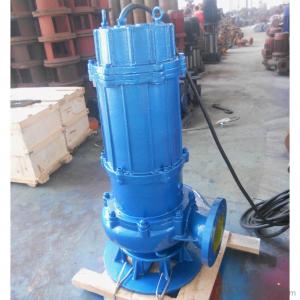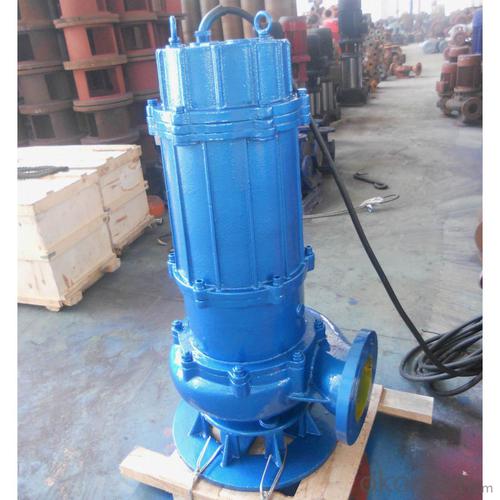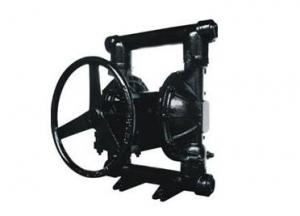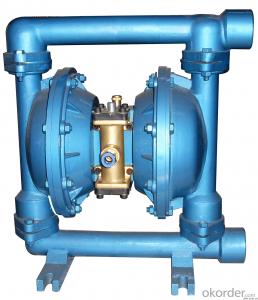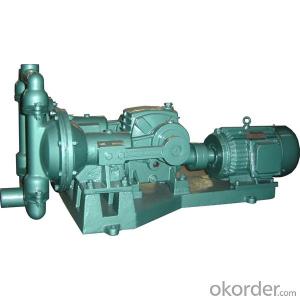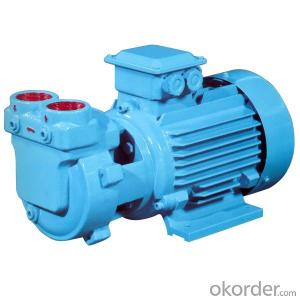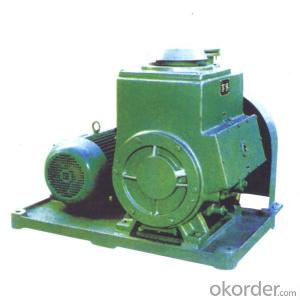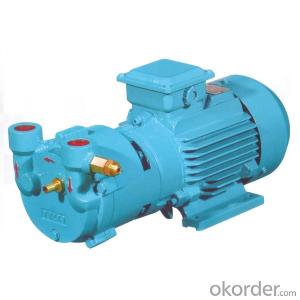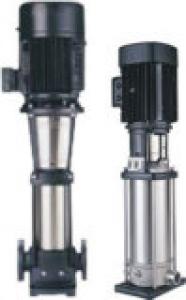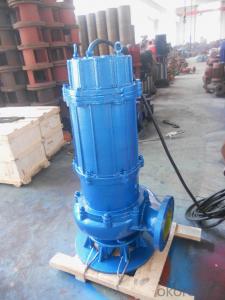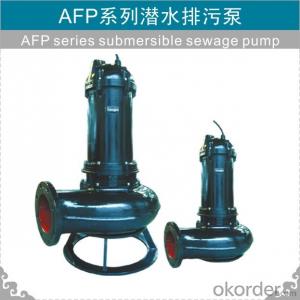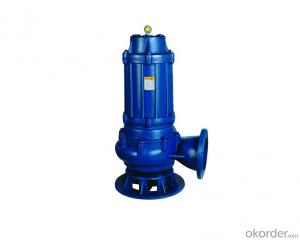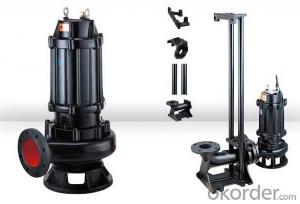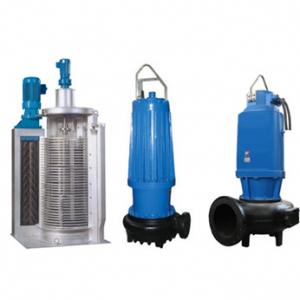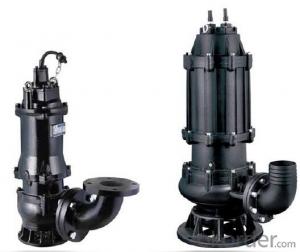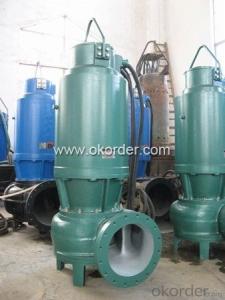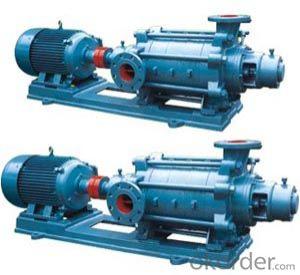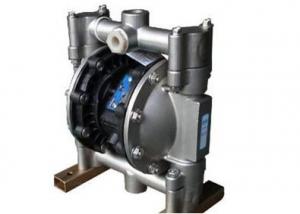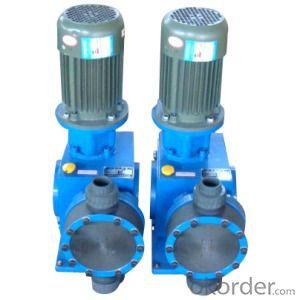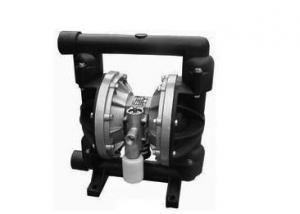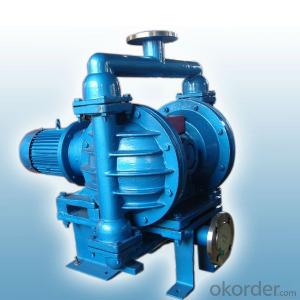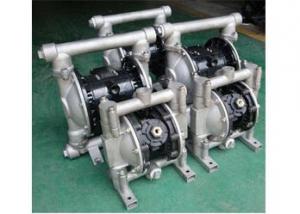Non-Clog Submersible Sewage Pump (WQ Series)
- Loading Port:
- China Main Port
- Payment Terms:
- TT OR LC
- Min Order Qty:
- -
- Supply Capability:
- -
OKorder Service Pledge
OKorder Financial Service
You Might Also Like
Performance & Advantages
Hydraulic Components With Large Flow Passage And Blockage-Resistance Design A Monitoring System For The Sealing Of The Oil Chamber
A Fully Automatic Safety Protection Control Box For Monitoring The Operation Of The Pump.
Range Of Application
Applicable For Chemical, Petroleum, Pharmacy, Mining, Papermaking, Pwoer Plant, Urban Sewage Treatment, Municipal Engineering And Public Facilities To Handle Sewage And Feculence Containing Particles.
Technology Parameters
Flow: 5-2000m3/H
Head: 5-50m
Rotary Speed: 580-2900r/Min
Calibre: φ 25-φ 400
Temperature: -15~+60 Degree
Working Pressure: ≤ 1.0mpa
- Q: Is it possible to control the air pressure generated by an air pump?
- Yes, it is possible to control the air pressure generated by an air pump. Air pumps typically have a control mechanism, such as a pressure regulator or adjustable valve, that allows users to dictate the amount of air pressure produced. By adjusting these controls, the user can increase or decrease the air pressure generated by the pump to meet their specific needs. This feature is particularly useful in various applications, such as inflating tires, operating pneumatic tools, or filling air mattresses, where different levels of air pressure may be required.
- Q: How efficient are air pumps?
- Air pumps are generally quite efficient, as they are designed to quickly and effectively inflate various objects such as tires, air mattresses, and sports balls. They are typically equipped with powerful motors and efficient mechanisms to generate sufficient pressure and airflow. However, the efficiency may vary depending on the specific model and purpose of the air pump.
- Q: What is the maximum airflow capacity of an air pump?
- The maximum airflow capacity of an air pump may vary depending on the specific model and manufacturer.
- Q: How can we do to make the oxygen pump slow oxygen tank
- Correct method:1, oxygen pumps do not open for 24 hours all day long.2, usually in the morning, afternoon, each charge 2 hours or so, charge more at night, if the weather is overcast, then open a longer time.3, if there is no filter, you should always change the water for the fish, preferably 3 or 4 days for each change of 1/3 of the total amount of water can be, but must be dried water.The water temperature should be about the same as the water temperature in the fish tank. Every time you don't feed too much, you should clean the excreta in the fish tank in time.4, oxygen pump should be placed outside the fish tank, there is a socket, connected to a tube, pipe, the other to find a gas stone (fish store selling 5 cents), the gas stone in the fish tank inside the line, the oxygen pump out of oxygen.At the end of 5, special attention should be paid to the height of a high oxygen pump tank water (can also go to the store to buy a fish anti reflux valve 50 Fen is connected with the air in the middle of that stone and oxygen pump pipe oxygen pump can be arbitrarily placed regardless of height).
- Q: What safety precautions should be taken while using an air pump?
- When using an air pump, there are several safety precautions that should be taken to ensure your well-being: 1. Read the instruction manual: Before using an air pump, carefully read the manufacturer's instruction manual. This will provide you with important information regarding safe operation, maintenance, and any specific precautions you should be aware of. 2. Wear protective gear: It is advisable to wear safety goggles or glasses to protect your eyes from any potential flying debris or accidental release of air. Additionally, using gloves can prevent injury while handling the pump or any sharp objects that may be involved. 3. Check for damage: Before using an air pump, inspect it for any visible damage such as cracks, cuts, or worn-out parts. Using a damaged pump can be dangerous and may lead to accidents or injuries. 4. Use in a well-ventilated area: Ensure that you use the air pump in a well-ventilated space to prevent the accumulation of harmful fumes or gases. This is particularly important if you are using a pump that runs on fuel or if you are inflating objects that release gases during the process. 5. Keep children and pets away: Air pumps can be noisy and may have moving parts that can cause harm. It is essential to keep children and pets at a safe distance to avoid accidents or injuries. 6. Use the correct power source: Depending on the type of air pump, it may require electricity, batteries, or fuel. Always use the appropriate power source as stated in the instruction manual. Using the wrong power source can damage the pump, cause malfunctions, or even result in electrical or fire hazards. 7. Pay attention to pressure limits: Air pumps typically have pressure limits that must not be exceeded. Overinflating objects can lead to bursting or explosions, causing serious injuries. Always check the recommended pressure for the item you are inflating and monitor the pressure gauge on the pump to ensure you do not exceed the limit. 8. Store properly: When not in use, store the air pump in a dry and secure place, away from extreme temperatures or direct sunlight. This will help maintain the pump's performance and prevent any potential accidents. By following these safety precautions, you can minimize the risks associated with using an air pump and ensure a safe and enjoyable experience.
- Q: How does an air pump handle saltwater exposure?
- An air pump may not be suitable for saltwater exposure as the salt can corrode its components, leading to potential malfunctions or damage. It is recommended to use a pump specifically designed for saltwater environments to ensure long-lasting performance and avoid any potential issues.
- Q: What are the common features of an air pump?
- Common features of an air pump typically include a motor or engine to generate power, an intake valve to draw in air, a compression chamber to pressurize the air, and an outlet valve to release the pressurized air. Additionally, air pumps often have a pressure gauge to monitor the level of air pressure and may include various attachments or nozzles for different applications.
- Q: Can an air pump be used for bouncy castles or inflatable toys?
- Yes, an air pump can be used for bouncy castles or inflatable toys. In fact, it is the most common and efficient way to inflate them. An air pump provides a steady stream of air that can quickly and easily fill up the inflatable structure. It is designed specifically for this purpose, with the right amount of pressure and nozzle attachments to fit the valves of bouncy castles and inflatable toys. Using an air pump ensures a safe and proper inflation, making the bouncy castle or inflatable toy ready for use in no time.
- Q: What is the average inflation time for an air pump?
- The average inflation time for an air pump can vary depending on the type and size of the pump, as well as the volume and pressure of the item being inflated. However, most air pumps are designed to inflate items within a few minutes to ensure quick and efficient inflation.
- Q: What are the different speed control options available in air pumps?
- The different speed control options available in air pumps include manual adjustment knobs, variable speed controllers, and programmable timers.
Send your message to us
Non-Clog Submersible Sewage Pump (WQ Series)
- Loading Port:
- China Main Port
- Payment Terms:
- TT OR LC
- Min Order Qty:
- -
- Supply Capability:
- -
OKorder Service Pledge
OKorder Financial Service
Similar products
Hot products
Hot Searches
